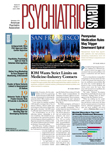Although it has long been known from twin studies that autism is strongly inherited, no gene variants have been commonly linked with the disorder.
Now a new study has achieved this feat.
The study involved more than 10,000 subjects, including individuals with autism spectrum disorders, their family members, and other volunteers throughout the United States. It found that a cluster of gene variants located on a particular region of chromosome 5—a region called 5p14.1—was commonly present in people with autism spectrum disorders.
The senior investigator was Hakon Hakonarson M.D., Ph.D., director of the Center for Applied Genomics at Children's Hospital of Philadelphia. The findings were published online in Nature on April 28.
These results were also confirmed by an independent group of researchers, headed by Margaret Pericak-Vance, Ph.D., a professor of human genomics at the University of Miami. In this study, genetic material was provided by 438 families where one or more members had a DSM-IV diagnosis of autism.
“Our identification and replication of common variation on chromosome 5p14.1 associated with autism is a promising development in the struggle to understand the genetics of autism,” they wrote in their paper, which was published in the May Annals of Human Genetics.
If these maverick gene variants on chromosome 5 truly contribute to autism, how might they do so? The variants nestle between two genes known to encode proteins that sit on the surface of neurons and enable the neurons to adhere to each other. Thus, the variants may make similar proteins. And if that is so, they could contribute to autism by sabotaging neuronal connections in the developing brain, Hakonarson and his team speculated in their paper. One reason to believe that this might be so, they explained, is that cell-adhesion proteins on the surface of neurons are known to help neurons migrate to correct places and to connect with other neurons. Another reason, they explained, is that “an increasing number of functional neuroimaging studies have suggested the presence of cortical underconnectivity in subjects with autism spectrum disorders....”
The studies were funded by the National Institutes of Health, Autism Speaks, and several other organizations.
An abstract of “Common Genetic Variants on 5p14.1 Associate With Autism Spectrum Disorders” can be accessed at<www.nature.com/nature/index.html> by clicking on “Advance Online Publication” and then scrolling to study reports from April 28. An abstract of “A Genome-wide Association Study of Autism Reveals a Common Novel Risk Locus at 5p14.1” can be accessed at<www.bmj.com/cgi/content/full/338/apr30_2/b1653> by clicking on “View content online,” “2009” and“ May.” ▪
